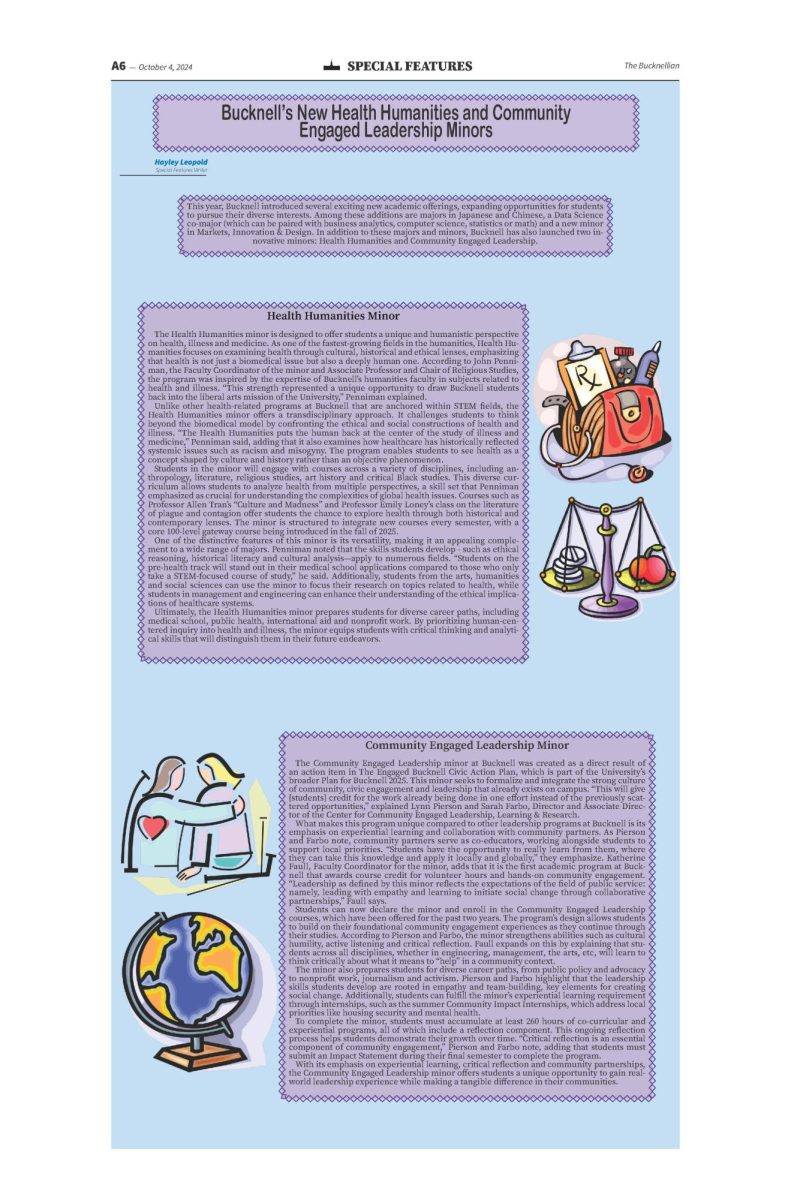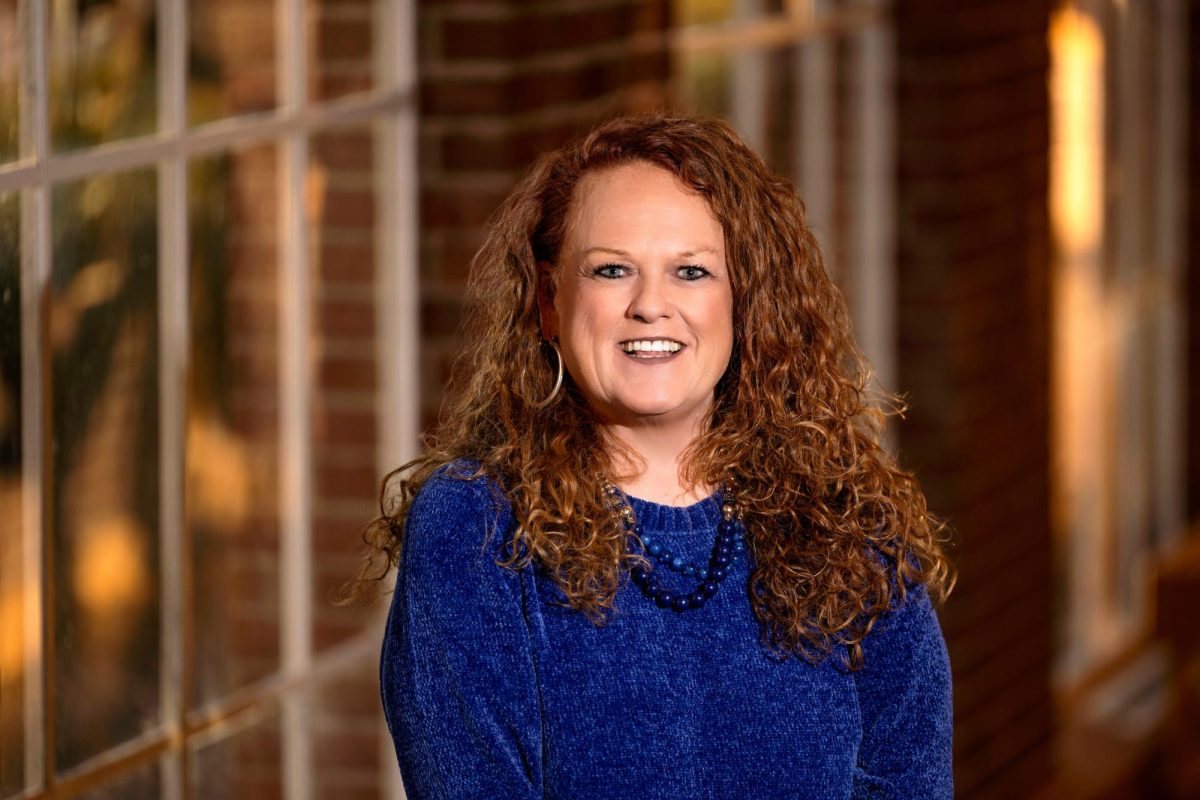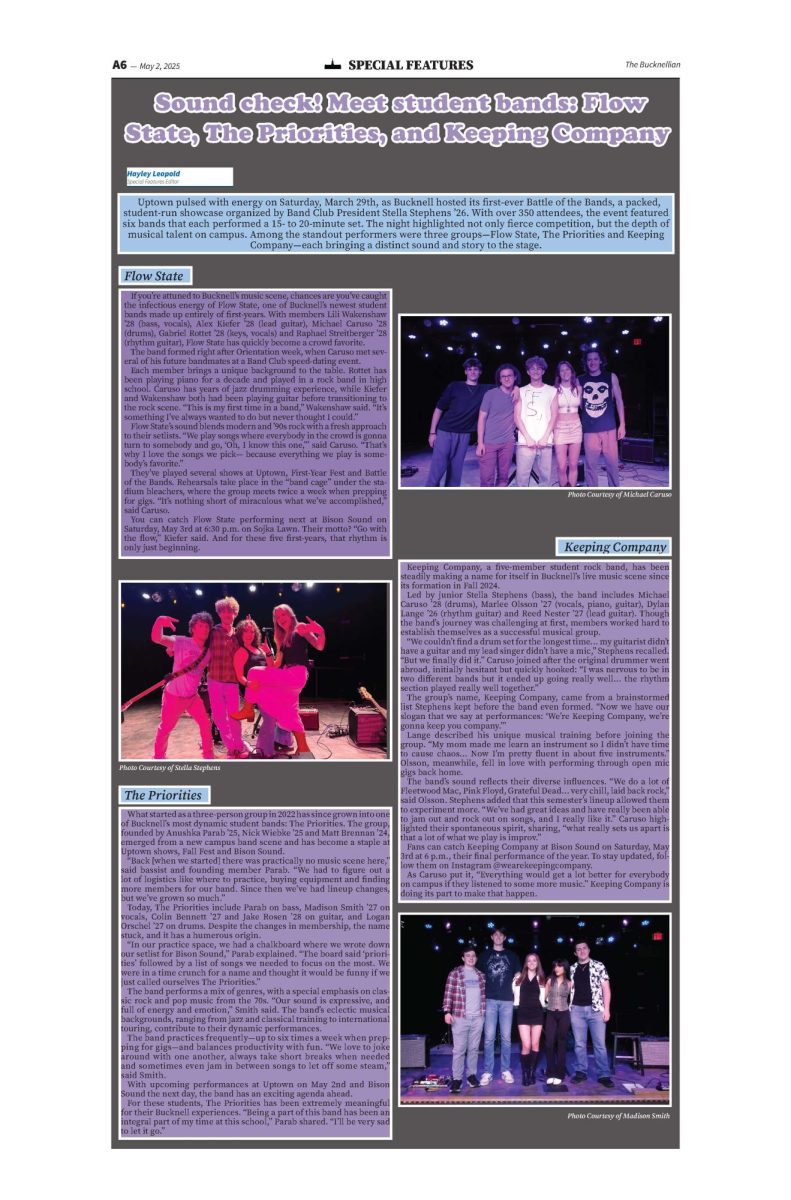This year, Bucknell introduced several exciting new academic offerings, expanding opportunities for students to pursue their diverse interests. Among these additions are majors in Japanese and Chinese, a Data Science co-major (which can be paired with business analytics, computer science, statistics or math) and a new minor in Markets, Innovation & Design. In addition to these majors and minors, Bucknell has also launched two innovative minors: Health Humanities and Community Engaged Leadership.
Health Humanities Minor
The Health Humanities minor is designed to offer students a unique and humanistic perspective on health, illness and medicine. As one of the fastest-growing fields in the humanities, Health Humanities focuses on examining health through cultural, historical and ethical lenses, emphasizing that health is not just a biomedical issue but also a deeply human one. According to John Penniman, the Faculty Coordinator of the minor and Associate Professor and Chair of Religious Studies, the program was inspired by the expertise of Bucknell’s humanities faculty in subjects related to health and illness. “This strength represented a unique opportunity to draw Bucknell students back into the liberal arts mission of the University,” Penniman explained.
Unlike other health-related programs at Bucknell that are anchored within STEM fields, the Health Humanities minor offers a transdisciplinary approach. It challenges students to think beyond the biomedical model by confronting the ethical and social constructions of health and illness. “The Health Humanities puts the human back at the center of the study of illness and medicine,” Penniman said, adding that it also examines how healthcare has historically reflected systemic issues such as racism and misogyny. The program enables students to see health as a concept shaped by culture and history rather than an objective phenomenon.
Students in the minor will engage with courses across a variety of disciplines, including anthropology, literature, religious studies, art history and critical Black studies. This diverse curriculum allows students to analyze health from multiple perspectives, a skill set that Penniman emphasized as crucial for understanding the complexities of global health issues. Courses such as Professor Allen Tran’s “Culture and Madness” and Professor Emily Loney’s class on the literature of plague and contagion offer students the chance to explore health through both historical and contemporary lenses. The minor is structured to integrate new courses every semester, with a core 100-level gateway course being introduced in the fall of 2025.
One of the distinctive features of this minor is its versatility, making it an appealing complement to a wide range of majors. Penniman noted that the skills students develop – such as ethical reasoning, historical literacy and cultural analysis—apply to numerous fields. “Students on the pre-health track will stand out in their medical school applications compared to those who only take a STEM-focused course of study,” he said. Additionally, students from the arts, humanities and social sciences can use the minor to focus their research on topics related to health, while students in management and engineering can enhance their understanding of the ethical implications of healthcare systems.
Ultimately, the Health Humanities minor prepares students for diverse career paths, including medical school, public health, international aid and nonprofit work. By prioritizing human-centered inquiry into health and illness, the minor equips students with critical thinking and analytical skills that will distinguish them in their future endeavors.
Community Engaged Leadership Minor
The Community Engaged Leadership minor at Bucknell was created as a direct result of an action item in The Engaged Bucknell Civic Action Plan, which is part of the University’s broader Plan for Bucknell 2025. This minor seeks to formalize and integrate the strong culture of community, civic engagement and leadership that already exists on campus. “This will give [students] credit for the work already being done in one effort instead of the previously scattered opportunities,” explained Lynn Pierson and Sarah Farbo, Director and Associate Director of the Center for Community Engaged Leadership, Learning & Research.
What makes this program unique compared to other leadership programs at Bucknell is its emphasis on experiential learning and collaboration with community partners. As Pierson and Farbo note, community partners serve as co-educators, working alongside students to support local priorities. “Students have the opportunity to really learn from them, where they can take this knowledge and apply it locally and globally,” they emphasize. Katherine Faull, Faculty Coordinator for the minor, adds that it is the first academic program at Bucknell that awards course credit for volunteer hours and hands-on community engagement. “Leadership as defined by this minor reflects the expectations of the field of public service: namely, leading with empathy and learning to initiate social change through collaborative partnerships,” Faull says.
Students can now declare the minor and enroll in the Community Engaged Leadership courses, which have been offered for the past two years. The program’s design allows students to build on their foundational community engagement experiences as they continue through their studies. According to Pierson and Farbo, the minor strengthens abilities such as cultural humility, active listening and critical reflection. Faull expands on this by explaining that students across all disciplines, whether in engineering, management, the arts, etc, will learn to think critically about what it means to “help” in a community context.
The minor also prepares students for diverse career paths, from public policy and advocacy to nonprofit work, journalism and activism. Pierson and Farbo highlight that the leadership skills students develop are rooted in empathy and team-building, key elements for creating social change. Additionally, students can fulfill the minor’s experiential learning requirement through internships, such as the summer Community Impact Internships, which address local priorities like housing security and mental health.
To complete the minor, students must accumulate at least 260 hours of co-curricular and experiential programs, all of which include a reflection component. This ongoing reflection process helps students demonstrate their growth over time. “Critical reflection is an essential component of community engagement,” Pierson and Farbo note, adding that students must submit an Impact Statement during their final semester to complete the program.
With its emphasis on experiential learning, critical reflection and community partnerships, the Community Engaged Leadership minor offers students a unique opportunity to gain real-world leadership experience while making a tangible difference in their communities.























